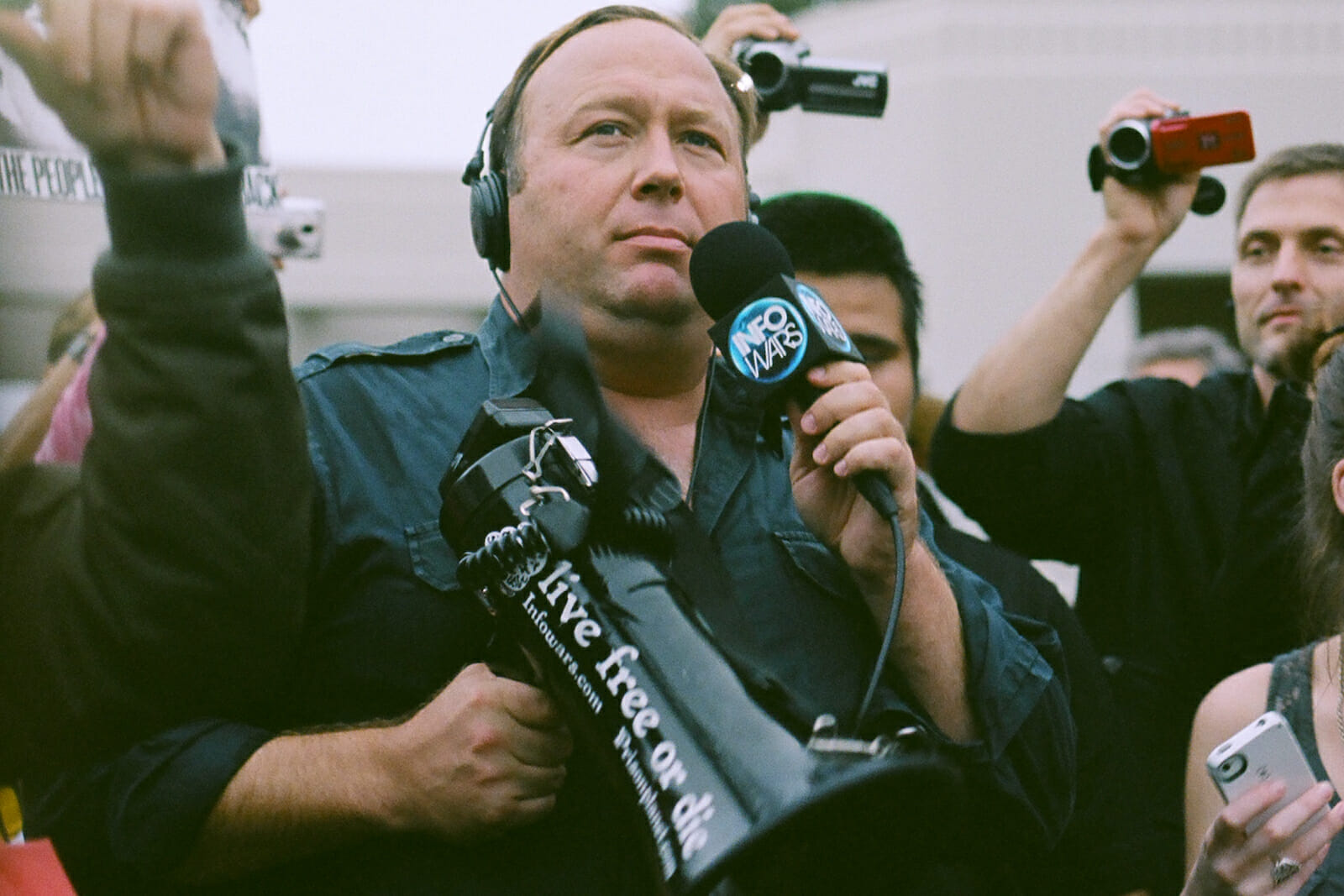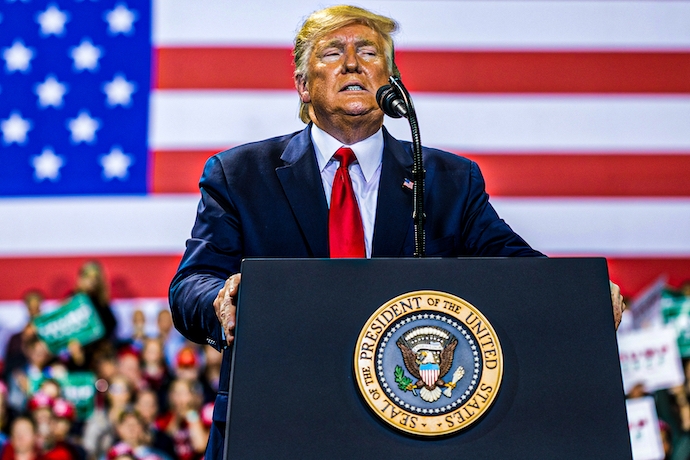
Media
Why Do Americans Fall for Fake News?
It feels like a long time ago, but the French elections only concluded in May of last year, with Emmanuel Macron securing a decisive victory over Marine Le Pen. Following the success of populist campaigns around the globe — Brexit, Poland, and Donald Trump — it was assumed by some that 2017 would be the year where the Le Pen family would finally put up a real fight. Indeed, just before the voting started, a haymaker came Macron’s way: France’s own version of an “October Surprise.”
On May 5, 2017, private emails from Macron’s campaign were hacked and subsequently released to the public. What’s worse: because they were released less than two days before the election, Macron couldn’t take any action to defend himself even if he wanted to, thanks to France’s election laws. However, instead of mild panic ensuing, the French people kept cool heads and helped Macron sail to a resounding victory. The punch never landed. Surely, anyone who has been following the plotline in this dramatic series knows that this isn’t how things are supposed to happen. So what did happen?
The National Security Agency (NSA) actually determined beforehand that the French election was vulnerable to Russian meddling. They warned the French that Russian hackers were attempting to disrupt the political process the same way they had done in the United States a year prior. But this time around, despite the sophistication of the leak and its proximity to the election, the charges didn’t stick. Why? Johan Hufnagel, the managing editor of a left-wing paper in France put it simply: “We don’t have a Fox News in France.” To understand the significance of his quote in the United States, you have to time-travel to the 1960s, eight years before Macron was even born.
In November 1969, Vice-President Spiro Agnew attacked the members of the media in a now-infamous speech, casting them as unelected elites wielding a monopoly on information in an attempt to manipulate the American people. He criticized their coverage of President Nixon directly, stating: “But the President of the United States has a right to communicate directly with the people who elected him, and the — and the people of this country have the right to make up their own minds and form their own opinions about a Presidential address without having the President’s words and thoughts characterized through the prejudices of hostile critics before they can even be digested.”
Agnew’s main goal was to delegitimize the media in order to counter the allegations of corruption that surrounded Nixon’s presidency. He made repeated references to the statements of various news anchors bemoaning their inability to remain “objective.” He used this opportunity, and others, to cast doubt on the credibility of the media. In Agnew’s defense, he wasn’t the first to try this tactic; Senator Joseph McCarthy referred to Edward R. Murrow and other journalists who were covering him as the “jackal pack” in an attempt to cast them as overzealous and biased sycophants who were also possibly Communist sympathizers.
History tells us that both McCarthy and Agnew ended up eating their words. McCarthy was eventually censured by his own colleagues and Agnew resigned as Vice-President due to mounting allegations of tax fraud and bribery; he eventually pleaded “no contest” to the charges. Still, the lasting effect of their actions is still coursing through our body politic today. Agnew’s designation of the Press as a liberal outfit hostile to conservative thought laid the groundwork for the hyper-partisan right-wing media to build their house on: First it began on Talk Radio in the 1980s, then moving onto TV with Fox News, and it is now building a solid presence on the Internet.
From his very earliest days on talk radio, Rush Limbaugh attacked the media for its liberal bias and discouraged his viewers from taking it seriously. Limbaugh created the model in the 1980s, and others like Sean Hannity followed it in the 1990s and beyond. Shortly after 9/11, a huge segment of the Republican base was getting its daily information from the “big three,” of Sean Hannity, Rush Limbaugh, and Mark Levin, with the irony perhaps lost on conservatives that Agnew himself began his attack with a criticism of ABC, NBC, and CBS.
With a unified chorus, conservative Talk Radio was sowing doubt into the legitimacy of not only ABC, NBC, and CBS, but also The New York Times and the Washington Post. Even when Limbaugh, Hannity, and others like Laura Ingraham were wrong and the “mainstream media” were right, they soldiered on. All three predicted a Romney win in 2012 (with Limbaugh specifically predicting 300+ electoral votes). In 2008, when asked to predict a race that nearly everyone could see would be a comfortable victory for Barack Obama, Limbaugh said that Obama had been “dead in the water” since the primaries and called the polls “worthless.” In reality, Obama’s margin of victory largely aligned with the polling averages, which gave him a consistent 7.6% advantage.
The repetition of Limbaugh’s model by the likes of Levin, Hannity, and then others on Fox News during Obama’s presidency made the base of the Republican Party susceptible to conspiracy theorists like Alex Jones — who previously espoused views about George W. Bush that earned him a small left-wing following — and, worst of all, Russian propaganda in the 2016 election. Smart right-wing punditry has, many times, been able to credibly expose what is probably a cultural bias in the mainstream media: The people who work in media generally spend most of their time in New York and D.C., but it’s not the traditionally more liberal values of these cities that damage the media’s perception: It’s the fact that they’re exceptionally large cities. Conservative writers like Jonah Goldberg and John Podhoretz have been able to credibly make this criticism and the media is probably better off because of it, but the Talk Radio Caucus is an entirely different entity. Limbaugh, Hannity, and Levin regularly tell their audiences to discount reality, so that they can all create their own.
Conservative writer Kevin Williamson struck a great balance between media criticism and how to read the actual news: “For conservatives, hating the media is a reflex, and sometimes a funny one: Speaking on his ‘Morning Minute,’ Sean Hannity once read breathlessly from an Associated Press report on a federal surveillance program, ending with the instinctual harrumph: ‘The mainstream media won’t tell you about that!’ There is no media more mainstream than the Associated Press, which is a nonprofit cooperative owned by its member newspapers, television networks, and radio stations. Its reports appear in practically every daily newspaper in the United States, and big scoops like the one that caught Hannity’s eye routinely lead front pages from sea to shining sea. The Associated Press has bias problems and some notable competency problems, and, like any organization that does any substantive reporting, it makes errors. But it does not, for the most part, traffic in fiction.”
Williamson’s effort is valiant, but when he’s addressing the readers of the National Review, he’s mostly preaching to the choir. The people who get their news from Sean Hannity aren’t going to care what someone from an Establishment Right-Wing magazine has to say. With so many in the Republican base ready to ignore and discount some of the most significant news stories in American history simply because they were originally reported by the New York Times, it was only a matter of time before someone like Trump took advantage. It’s true that people like Limbaugh, Hannity, Tucker Carlson, and Jeanine Pirro inarguably benefit from Trump’s Presidency, but the relationship is much more symbiotic than people realize. Sure, a lot of conservatives like to read National Review, The Weekly Standard, and The Wall Street Journal, but the seeds of doubt are present in even the Kevin Williamsons of the world, and that is largely thanks to a wave of media criticism spanning forty years.

While the two most famous incidents associated with Russian meddling in our election in 2016 remain the hacks of both the Democratic National Committee (DNC) and John Podesta’s emails, the routine dissemination of fake stories all throughout Facebook is often downplayed or even outright mocked. The Kremlin’s effort included pro-Trump websites run by teenagers in the Balkans, as well as the advancement of the now well-known conspiracy theory, “Pizzagate.” It’s impossible to know what impact these stories had on the election, but it’s worth noting that one person took the latter seriously enough to show up at a pizza place and fire off a gun. That requires a fundamentally different set of beliefs than most conservatives espoused during the Nixon years, and even after.
In 2016, it wasn’t just that many on the Right already distrusted the legacy newspapers: The near-constant influx of news — real or fake — created an environment that made it difficult for people working in journalism, let alone the average citizen at home, to discern what was legitimate and what was not. Couple that with an entire segment of the Republican Party rejecting every mainstream media source as biased, and it can become so frustrating for the neutral person that he just assumes both sides are lying in some way. This frustration can lead to exasperation: Because voters cannot discern who is telling the truth — Fox News or CNN — they tune out everything altogether. Such an environment, in and of itself, is central to the Kremlin’s manipulation of the Russian people.
Writing in 2014, former Moscow-based TV producer Peter Pomerantsev, said: “At the core of this strategy is the idea that there is no such thing as objective truth. This notion allows the Kremlin to replace facts with disinformation. We saw one example when Russian media spread a multitude of conspiracy theories about the downing of Malaysia Airlines Flight 17 over eastern Ukraine in July, from claiming that radar data showed Ukrainian jets had flown near the plane to suggesting that the plane was shot down by Ukrainians aiming at Mr. Putin’s presidential jet. The aim was to distract people from the evidence, which pointed to the separatists, and to muddy the water to a point where the audience simply gave up on the search for truth.”
There is a general understanding that if you watch two different takes on the day’s major news, “the truth ends up somewhere in the middle.” The Kremlin was able to convince its people that knowing the truth was simply unattainable and polls show that America isn’t all that far off. To be clear, the Republican base doesn’t have a monopoly on the “fake news” genre. There are elements of it on the Left that are troubling, but overall it lately consists of a few poorly constructed memes with fake quotes from Thomas Jefferson; it’s nothing as serious as denying reality, but even a single false story allows Trump and his supporters to claim validation for their charges of “fake news.”
This sort of environment works out for a President who has a very loose relationship with the truth and the total devotion of his supporters. For instance, in July of 2017, the New York Times broke a major story: Donald Trump, Jr., Paul Manafort, and Jared Kushner, all held a meeting with a Kremlin-connected lawyer promising dirt on Hillary Clinton. While most outlets — including those run by conservatives — conceded that this could be the “smoking gun” documenting coordination between the Trump campaign and the Russians, Trump’s supporters in the media went on the offensive. Hannity himself declared Hillary Clinton to be the real person guilty of collusion, citing a Politico piece from January 2017. The Politico story and the actual story about Trump, Jr’s meeting with a foreign adversary who interfered in our election couldn’t be more different, but the coverage of both from Hannity and others on Fox News gave Trump’s supporters all they needed to deny the significance of the meeting. For many neutral observers, the water gets so muddied that it’s easy to assume that it covers “both sides.”
It’s in such muddied waters where Trump not only survives, but thrives: Maybe Obama did not really direct that a wiretap be installed in Trump Tower, but the names of Trump’s associates were “unmasked” so it’s kind of the same. Maybe Trump did separate children from their parents at the border, but Obama and George W. Bush did it too. Figuring out the objective truth in each situation becomes so difficult that many don’t bother looking for it at all.
The future begins to look more dangerous when you factor in two separate issues: the rise of actual Fake News outlets like Alex Jones, Paul Joseph Watson, Dick Morris, and Mike Cervnovich and Interference in our elections by the Russian government. The latter point is especially relevant, since — by all indications — the Russians are planning to mount another propaganda campaign this coming November. With somewhere around 54% of Republicans actively disbelieving anything reported by the mainstream U.S. media, they are a soft target for disinformation. And while the general health of the democracy can claim some small victories — to wit, Alex Jones’s suspension from all major platforms, most notably Facebook and iTunes — as of late, it still feels as if it is in a precarious position. There is a third point that is related to the other two outlined above: Special Counsel Robert Mueller will eventually complete his investigation and his findings could be incredibly damaging for President Trump.
In a political environment where a majority of one Party is seemingly ready to deny reality, what will the outcome be if Republicans in Congress ignore Mueller’s findings? There is an assumption among many in the media that eventually the Nixon example will prove true: Republicans supported Nixon right up until the moment he fired Special Prosecutor Archibald Cox, and then abandoned him. Many assume that eventually, a moment will come in the Mueller investigation that causes the fever to break.
President Nixon completely changed the way the Presidency interacted with the media. He had Agnew attack it relentlessly and he himself was hostile towards and tough with reporters, But Trump is a completely different animal. Trump calls any negative news about him “fake,” and his followers believe this. That is a more troubling situation than we ever faced with the likes of Agnew, and maybe answers the question, “Why do Americans Fall for Fake News?” The answer is: “Probably because they want to.”
